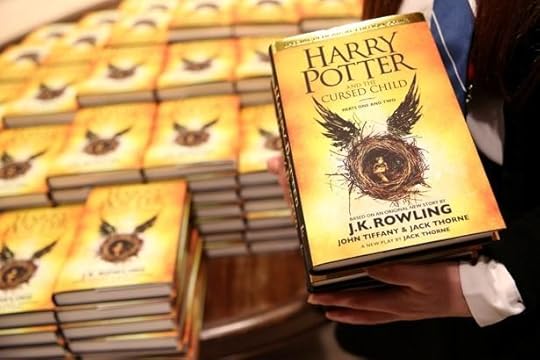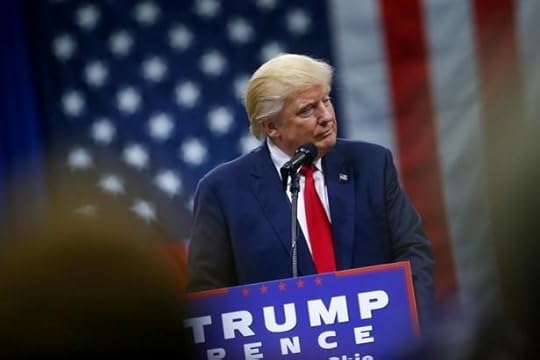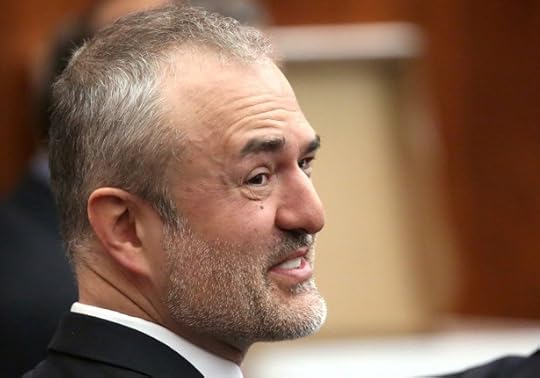Atlantic Monthly Contributors's Blog, page 109
August 2, 2016
The Trouble With Police Body Cameras

NEWS BRIEF A Chicago police officer who fatally shot a black man in the back last week was wearing a body camera during the shooting, but the camera was turned off at the time, officials with the city’s police department said Monday.
The incident has started a controversy over the effectiveness of body cameras, which can be controlled by the officers wearing them. The officer who shot and killed 18-year-old Paul O’Neal has been placed on paid administrative leave, along with two other officers involved in the shooting. A lawyer representing O’Neal’s family said they have filed a wrongful death lawsuit.
O’Neal was killed July 28 in Chicago’s South Side. He was driving a Jaguar that was reported stolen. Officers began to chase after him, and O’Neal crashed into a police cruiser. As O’Neal ran away, officers shot him in the back.
The camera worn by one officer reportedly captured the beginning of the chase, but cut out before the fatal shot. The Chicago Police Department began testing body cameras in 2015, but only in one district. It recently expanded the technology to six other districts, and, according to the Chicago Tribune, the officer involved in the shooting had only used the camera for one month. The head of the police union that represents officers in the department blamed the camera’s dysfunction on a “learning curve.” But the family’s lawyers called the missing footage a coverup.
The Tribune points out the incident comes at an already complicated crossroads between police and citizens in Chicago:
Chicago's increased use of body and dashboard cameras comes as the department faces one of worst crises in its history. The court-ordered release of a video in November of a white officer shooting black teen Laquan McDonald 16 times led to widespread protests, the firing of then-Superintendent Garry McCarthy and the launching of a U.S. Justice Department probe of policing practices.
Police officials said the three officers were suspended because they violated department policies. In 2015, according to the Tribune, the department changed its use-of-force policies and prohibited actions that would put themselves or others in “unreasonable danger.”
Body cameras have been seen as the latest solution to officer oversight, given the number of high-profile deaths of unarmed black men in the last two years. After the fatal police shooting of Laquan McDonald, a 17-year-old in Chicago whose death started a battle to release the footage of the incident, Chicago enacted a policy that calls for releasing police shooting footage within 60 days. The footage of the shooting of Paul O’Neal has not yet been released. A dashboard camera from an officer’s car reportedly caught some of the shooting, and department Superintendent Eddie Johnson told The New York Times this footage was “very helpful” in suggesting the officers had violated department policy.

August 1, 2016
Harry Potter and the Curse of Continuation

(This review contains plot information regarding Harry Potter and the Cursed Child but only very mild spoilers.)
In 2013, J.K. Rowling wrote a short post (since deleted) on Pottermore, the official Harry Potter website, detailing her thoughts about using time travel as a device in literature. In the third book in the Harry Potter series, The Prisoner of Azkaban, Harry’s friend Hermione Granger uses a device called a Time-Turner to attend multiple classes in a single school hour, and the Time-Turner later factors into the plot when Harry and his friends use it to battle Dementors and help Sirius Black escape execution. “I went far too light-heartedly into the subject of time travel in Harry Potter and the Prisoner of Azkaban,” Rowling wrote. “While I do not regret it … it opened up a vast number of problems for me, because, after all, if wizards could go back and undo problems, where were my future plots?”
After Azkaban, Time-Turners were eradicated from Rowling’s magical universe. Hermione returned hers to Professor McGonagall, and all remaining instruments were apparently destroyed in a climactic battle in the Department of Mysteries in the fifth book, Harry Potter and the Order of the Phoenix, ruling out any more time travel. Rowling concluded the Harry Potter series with a natural leap forward, showing Harry and his wife, Ginny, saying goodbye to their second child, Albus Severus, on the platform at King’s Cross as they sent him off to his first term at Hogwarts. It seemed as definitive an ending as any, but it’s at that exact moment that the newest installment of Harry’s story picks up.
Harry Potter and the Cursed Child, the script of a two-part play that recently opened in London’s West End, is a faithful continuation of Rowling’s series that simultaneously breaks many of her rules. Although Rowling was involved in writing the story, the script is written by Jack Thorne, and the plot hinges on time travel in a way that prompts the question of how much Harry’s creator was involved, with wizards seeking to undo problems in a way that inevitably backfires. While almost all the major characters from the series return in some form or another, they’re less compelling than the two young heroes of the play, Albus Severus Potter and Scorpius Malfoy, the sons of Harry and his former rival Draco. As Albus and Scorpius struggle with living under the shadows cast by their fathers, Cursed Child too seems to wrestle with its legacy, borrowing heavily from older stories while simultaneously challenging the confines of their world.
Reading the next Harry Potter story in script form rather than in Rowling’s fluid, vivid prose was always going to be challenging for readers, so what’s most remarkable about Thorne’s work is how smoothly it flows. At its best, it’s as gripping as many of Rowling’s books were, with suspenseful plotting and twists that are just predictable enough to be gratifying. The stage directions are sometimes sparse, sometimes remarkably descriptive. (Here’s one after a Hogwarts student is drafted by the Sorting Hat: “There’s a silence. A perfect, profound, silence. One that sits low, twists a bit, and has damage within it.”)
The awkward hero of the first half is Albus Severus, Harry’s middle child, dwarfed by both his cocky, popular older brother, James, and his father’s impossible fame as The Boy Who Lived. The fourth scene of the first act, set in “a never-world of time change,” reveals glimpses of Albus’s increasing unhappiness after he arrives at Hogwarts, shows a disappointing lack of magical fluency, and is shut out by his fellow students. His one friend is Scorpius, a disarmingly sweet boy (in his first greeting with Albus, he literally sings about candy) who’s also an outcast because of outlandish rumors that he’s actually the son of … well, you know who.
It would be impossible to come up with a villain as cruel, malevolent, and outright fascinating as Lord Voldemort for the Cursed Child heroes to battle, so it’s almost poetic that Albus’s biggest enemy instead is his father. Thorne’s Harry Potter, all grown up, features prominently in the play, and the tension between him and his son is one of the most frustrating plot points, born out of dramatic necessity and riddled with cliché and angsty platitudes. “I didn’t choose, you know that?” Albus glowers in one scene. “I didn’t choose to be his son.” Later, Harry echoes the sentiment, saying, “Well, there are times I wish you weren’t ...” Although he immediately apologizes, why he feels this way is never really made clear; readers are left to intuit simply that the relationship is a troubled one.
The discombobulating influence of going back in time and making tiny changes is one Potter fans are well aware of by now.
Without revealing too much, Albus responds to his father’s outburst by conspiring with a mysterious blonde young woman, Delphini, to go back in time and save one soul lost along the path of his father’s story. His motivation is shaky at best, but the decision pulls Albus, Scorpius, and Delphini into a montage of moments from Harry Potter history: The Tri-Wizard Tournament, a caper involving Polyjuice potion, the Forbidden Forest, a fearsome encounter with dementors. It’s familiar and well-worn territory at this point, and it might seem yawningly predictable if not for the shocking revelations that come in part two, many of which seem to destabilize Rowling’s universe rather than expand it.
Cursed Child, for one thing, seems fixated with chance, and the extraordinary power of twists of fate. The Harry Potter series always seemed to be a firm believer in free will—the power to change destiny by making specific and often difficult decisions. In the first book in the series, the Sorting Hat ponders whether Harry belongs in Gryffindor or Slytherin: “Difficult. Very difficult. Plenty of courage, I see. Not a bad mind, either. There’s talent, oh my goodness, yes—and a nice thirst to prove yourself, now that’s interesting … So where shall I put you?”
“Not Slytherin,” Harry thinks, gripping his chair. The hat goes along with his request. But Albus, by contrast, is given no such choice. And as his tweaks in the space-time continuum play out, futures are similarly reshaped and lines redrawn in the blink of an eye. Good characters go bad. Terrible characters reemerge. “It feels like we were all tested, and we all—failed,” says Scorpius.
The discombobulating influence of going back in time and making tiny changes is one Potter fans are well aware of by now. For years since the release of the final book, Harry Potter and the Deathly Hallows, Rowling has proffered hints and facts and tidbits that range from the remarkable (the beloved Hogwarts headmaster Albus Dumbledore was gay) to the banal (Teddy Lupin became a Hufflepuff). “The more Rowling enhances and embellished her Harry Potter universe,” my colleague David Sims wrote last year, comparing Rowling to George Lucas, “the less room she leaves for readers to fill in the gaps with their own imaginations.”
Cursed Child, by this measure, is an act of overreach that feels mandated not by Rowling’s desire to fill out details but by an entertainment industry intent on reviving and rebooting anything that’s ever made money. Already, Warner Bros. (who produced all eight Harry Potter movies, which grossed more than $7.7 billion) has filed a film trademark for the title. The West End production is reportedly considering a move to Broadway. Harry Potter and the Cursed Child Parts I and II is expected to become the bestselling book of 2016: an extraordinary achievement for the published script of a play.
Reading Cursed Child, for all its compelling twists and turns, at many points feels like reading well-crafted fan fiction—the names are the same, and the characters feel familiar, but it’s apparent that they’re imitations nonetheless. It’s entirely possible that seeing the stage play, directed by the monumentally talented John Tiffany (Black Watch), is a different experience, and certainly there’s no sign of anything but a furious demand for tickets. But for readers, in agreeing to revisit characters whose stories have already been deftly wrapped up, Rowling risks undermining the powerful legacy she gave them in the first place.

France's Disappearing Mosques

NEWS BRIEF French authorities shut down 20 mosques and prayer halls they found to be preaching radical Islamic ideology since December, French Interior Minister Bernard Cazeneuve said Monday.
Lutte contre la #radicalisation : depuis décembre 2015, une vingtaine de lieux de culte musulman ont été fermés
— Ministère Intérieur (@Place_Beauvau) August 1, 2016
“Fight against the #radicalization: since December 2015, twenty Muslim places of worship have been closed,” the Interior Ministry tweeted.
Of the country’s 2,500 mosques and prayer halls, approximately 120 of them have been suspected by French authorities of preaching radical Salafism, a fundamentalist interpretation of Sunni Islam, according to France 24.
“There is no place ... in France for those who call for and incite hatred in prayer halls or in mosques … About 20 mosques have been closed, and there will be others,” Cazeneuve said.
The announcement came days after French Prime Minister Manuel Valls called for a temporary ban on foreign funding of French mosques. A Senate committee report on Islam in France published in July found that though the country’s mosques are primarily financed through individual donations, a significant portion of their funding also comes from overseas—specifically from Morocco, Algeria, and Saudi Arabia. The same report called banning foreign financing of mosques “absurd and impossible,” calling instead for more transparency.
Because of France’s 1905 law establishing the separation of church and state, or laïcité, the French government cannot finance religious institutions directly. Some experts say this rule has made many mosques reliant on foreign funding.
Cazeneuve also announced Monday that French authorities would be working with the French Muslim Council to launch a foundation to help finance mosques within France.
D'ici octobre, une fondation sera créée pr financer l'aspect culturel des instituts cultuels et des bourses pr l'enseignement laïque #islam
— Ministère Intérieur (@Place_Beauvau) August 1, 2016
“By October, a foundation will be created to finance the cultural aspect of cultural institutions and scholarships for secular education #islam,” he said.
The mosque closures follow several high-profile attacks by Islamic extremists in the country in less than two years, including the recent murder of a Catholic priest in Normandy. France has been under a nationwide state of emergency since the ISIS attacks in Paris in 2015, which grants the state the ability to enforce tougher measures, including shutting down places of worship suspected of promoting radical views.

Trump's Turn Toward Appeasement

Is it going to be like this every day for the next 98 days?
Speaking on Monday in Columbus, Ohio, Donald Trump delivered a new series of head-spinning remarks. Most notably, Trump defended controversial comments he made about Ukraine and Crimea over the weekend, and he preemptively questioned the legitimacy of the elections, suggesting that the election might be “rigged.”
Speaking with ABC’s George Stephanopoulos over the weekend, Trump said of Russian President Vladimir Putin, “He's not going to go into Ukraine, all right?You can mark it down and you can put it down, you can take it anywhere you want.” When Stephanopoulos noted that Russia had already forcibly seized Crimea, a portion of Ukraine, Trump parroted the Kremlin’s line that Crimea belongs properly to Russia: “You know, the people of Crimea, from what I've heard, would rather be with Russia than where they were.”
On Monday, Trump accused the media of dishonestly reporting his comments. He argued that tense was what mattered: When he said Putin is “not going to go into Ukraine,” he meant that he would not go further during a Trump presidency. Trump also insisted that he was aware of Russia’s annexation of Crimea.
“I know, two years ago approximately. It was taken during Obama’s watch. So when I said, ‘Believe me, Russia’s not going into Ukraine… the person said, ‘But they’re already in Ukraine,’” Trump said. “I said, ‘Yeah, that was two years ago.’ You want to go back? You want to have World War III to get it back?”
It’s the second time in a week that Trump has suggested, more or less explicitly, that he would be inclined to recognize Putin’s seizure of Crimea. U.S. policy, as well as the policy of NATO and most nations, has been that the annexation was illegal and illegitimate and must be reversed. Only a handful of countries—notably Cuba, Syria, North Korea, Venezuela—have recognized it. Last week, Trump said he’d “look into” recognition. His comments today, juxtaposing legitimacy with World War III were quickly labeled “appeasement,” a reference to the Allies’ decision not to dispute Hitler’s seizure of the Sudetenland in 1938.
Trump’s stance on Russia is peculiar. For the last eight years, Republicans have argued that President Obama was naive to attempt a “reset” of relations with Russia, and have complained that he appeases international bullies. Discussing the Iran nuclear deal, Senator Tom Cotton, a hawkish Republican, told my colleague Jeffrey Goldberg, “It's unfair to Neville Chamberlain to compare him to Barack Obama.” Yet the Republican nominee for president is now endorsing appeasement in Ukraine. In his many favorable comments about Putin, which he reprised Monday, he has embraced the idea of a reset (without using the word). In essence, that has left Trump arguing that Obama has been a disaster, and that he will pursue many of the same policies that Obama has. (This has also driven many GOP foreign-policy figures to near-frenzy and even to endorse Hillary Clinton, though Cotton has stuck with his endorsement of Trump.)
At another point in the rally, Trump began to question whether the election will be fair. “I'm afraid the election’s gonna be rigged, I have to be honest,” he said. While such accusations are hallmarks of less-developed countries, U.S. presidential candidates in the modern era have seldom or never questioned the legitimacy of results, and even Al Gore conceded the extremely close election of 2000. Polls in the last couple days have shown Clinton leading Trump.
These were not Trump’s only peculiar comments of the rally. He wondered aloud about whether he should revoke credentials for The New York Times. He bragged at length about his victories in the Republican primary, even with the general election barely three months away. He went on a strange digression about how great his children’s speeches at last month’s Republican National Convention were. Even though that convention was in Cleveland, Trump dourly announced, “They call it the Rust Belt … because everything's rusting and rotting.” And for the second time in four days, Trump tried to pick a fight with the fire marshall, bashing local officials for capping attendance at his rally. He did the same in Colorado Springs on Friday, even after firefighters freed him from a stuck elevator.
The one thing Trump did manage to avoid talking about was Khizr and Ghazala Khan. The Republican has gone out of his way to feud with the father and mother of Captain Humayun Khan, who was killed in combat with the U.S. Army, since they criticized him in a speech at the Democratic convention. By continuing to talk about a story that seems damaging to him, Trump has pumped oxygen into it like a bellows full of hot air.
Nonetheless, it was yet another bizarre, wandering campaign event. These events do very well at keeping Trump in the headlines. Whether they can vault him to a general-election win is an open question. So far, there’s little evidence they’re helping—and based on his worries about rigged elections, it doesn’t look like Trump is confident about the results either.

Is Trump Planning to Skip the Presidential Debates?

Several times during the Republican National Convention, I found myself in the midst of conversations—with journalists, delegates, and others—about whether or not Donald Trump would bother to participate in the presidential debates this fall.
Forecasting Trump’s decisions is impossible, but if the Republican nominee decides he wants to skip at least one debate, he started laying the groundwork this weekend. Late Friday night, he tweeted an accusation that Democrat Hillary Clinton was trying to rig the debate schedule:
As usual, Hillary & the Dems are trying to rig the debates so 2 are up against major NFL games. Same as last time w/ Bernie. Unacceptable!
— Donald J. Trump (@realDonaldTrump) July 30, 2016
He repeated that thrust during an interview on ABC’s This Week. “Well, I'll tell you what I don't like. It's against two NFL games, I got a letter from the NFL saying, this is ridiculous, why are the debates—because the NFL doesn't want to go against the debates,” he said.
Trump was lying on both counts. There’s no evidence of Clinton tampering with debate dates, and as CNN’s Brian Stelter pointed out to Trump spokesman Jason Miller, the NFL released a statement saying, “While we obviously wish the debate commission could find another night, we did not send a letter to Trump.” Appearing on Reliable Sources, Miller hemmed and hawed over whether had Trump had received a letter, even though it was by now clear he had not. (This fits with a pattern of Trump needlessly lying. He also claimed that he had recommended that the Republican convention be held in Cleveland, even though he was not a candidate or even a likely one at the time, and no evidence exists that he made such a recommendation.)
In any case, Stelter asked Miller whether Trump wanted the debate dates changed:
Jason Miller: We would not like the debates not be head to head against major NFL games. We like to see some—that's something we'll be discussing as we got into negotiations.
Brian Stelter: Will Trump skip the debates if they are continued to be scheduled on football nights?
Miller: Brian, we want as many people to be watching the debates as possible. That's our spirit of it. The Clinton camp would like these debates to be head-to-head with the NFL games. So, we're going to go in and start negotiations...
In other words, Miller was unwilling to commit to Trump debating. Stelter pressed Miller further, pointing out that there was no evidence that Clinton wanted the debates head-to-head with NFL games. “Why did Mr. Trump say that Clinton is trying to rig the debates?” Stelter asked. Miller replied:
Brian, if you take a look back at Hillary Clinton's track record in the primary, numerous times they had pushed to go on and have debates at the same time as other big events that were going on, head to head against things that would be big conflicts and keep voters excluded. Our focus, we want as many people involved as possible.
Miller is right that the Democratic debates were scheduled for mysteriously low-profile times. Many observers presented this as evidence of the Democratic National Committee trying to engineer low-profile meetings to aid Hillary Clinton. If so, the decision may not have paid off: Clinton ended up having a tough race against Senator Bernie Sanders, but she consistently performed well in debates.
But all of that is irrelevant to the presidential debates. Unlike primary debates, which are scheduled with cooperation between the candidates and their campaigns, their respective party committees, and the networks that will broadcast them, the general-election debates are produced by the Commission on Presidential Debates. It’s an independent organization created after the 1984 elections, which has run the debates in every presidential-election year since. The debates are shot by pooled press, and they’re available to networks to air but have to be aired in their entirety, without commercials, on the premise that they’re providing a national public service and shouldn’t be monetized.
The idea that the CPD is working to throw the debates doesn’t bear much scrutiny. CPD announced the dates for the debates in September 2015. And while the commission studiously insists it’s nonpartisan, it is in practice mostly a bipartisan body, made of former political hands of both parties. The chairs are Frank Fahrenkopf, a former head of the RNC, and Mike McCurry, former press secretary under Bill Clinton. Other Republicans on the commission include former Indiana Governor Mitch Daniels and former Senator Olympia Snowe. It’s not a body that seems likely to throw the debates in favor of Clinton. (McCurry even publicly counseled her against running.) Neither of the parties gets a role in scheduling or planning the debates, nor do the candidates, although the candidates typically negotiate some mutually agreed-upon rules.
On Sunday, the Commission replied to Trump in a statement:
The Commission on Presidential Debates (CPD) started working more than 18 months ago to identify religious and federal holidays, baseball league playoff games, NFL games, and other events in order to select the best nights for the 2016 debates. It is impossible to avoid all sporting events, and there have been nights on which debates and games occurred in most election cycles. A debate has never been rescheduled as a result.
As a point of reference, in a four-year period, there are four general election debates (three presidential and one vice presidential) and approximately 1000 NFL games.
In November, I spoke with Newton Minow, the former chair of the Federal Communications Commission who helped create the modern age of televised debates and later co-founded the CPD.
“I think the public at this point doesn’t want the parties or the candidates to run the debates. The public likes the idea of journalists asking tough questions,” he said. “I think the public knows that the debates are fair, and they trust the debates are fair. At the level of the debate commission, the concern I think of each and every commissioner is to have debates that will serve the public interest, not the parties’ interest, not the candidates’ interests.”
The CPD has been criticized, sometimes harshly, for wielding too much control, or for not letting third-party candidates join debates (they must reach a 15 percent polling threshold), or for being too slow to embrace new technologies. Whatever gripes other candidates have, however, it’s generally been regarded as a honest broker between the two major parties.
Already last fall, Minow—who has been involved in presidential campaigns since he worked for Adlai Stevenson’s 1952 team, and at 90 years old has seen plenty more—was taken aback by the 2016 race.
“I thought I understood national politics pretty well, but this year is so baffling that I feel like I’m in another culture,” he told me.
One way Trump has overturned the understanding of people like Minow is his willingness to undermine the authority of longstanding institutions. He’s been singularly willing to bash the Republican Party publicly, and even now, with the nomination battle long over, he can’t resist taking shots at vanquished rivals. With the debates approaching, he’s perfectly willing to assail the neutrality of the debate commission, despite having no evidence, and while blatantly lying.
Why wouldn’t Trump want to debate? The Republican primary debates didn’t hurt him, and in fact may have helped him by hurting his rivals. But Trump proved an unsteady debater, at times mounting effective attacks but at other times seeming bored and checked out. He also made several errors that continue to haunt him today, from his ignorance about the nuclear triad to the sexist feud he began with Fox News’ Megyn Kelly. Trump has also shown a willingness to skip debates. He refused to attend one Fox News debate in January, spurred in part by the Kelly feud, and then again declined to participate in a March debate, effectively canceling it.
The general-election debates might prove tougher territory still for Trump. They have larger national audiences. Because they're not party-sponsored, there’s room for a wider range of questions. With fewer candidates on stage, Trump would be less able to fade into the background. Clinton is an experienced, skilled debater who has shown an ability to get under Trump’s skin. Of course, there are dangers to skipping debates, too. By refusing to participate, Trump would miss a major national moment and could appear petulant and cowardly. No major candidate has taken that risk since Richard Nixon, who had been so badly burned by his televised debate with John Kennedy in 1960 that he declined to debate on TV in 1968 or 1972. But if Trump decides he’s willing to roll the dice, he will have begun laying the groundwork this weekend.

Tallulah Finds Depth in the Melodrama of Motherhood

A homeless young drifter, feeling lost after breaking up with her boyfriend, steals a baby from a negligent, rich housewife, triggering a police manhunt. A successful academic, still haunted by her husband’s decision to leave her for a man, gets swept up in the drama when the baby shows up on her doorstep, with its kidnapper claiming it’s her granddaughter. Tallulah, which premiered on Netflix this weekend, has the melodramatic premise of a Lifetime original movie, but it stands out thanks to the graceful, thoughtful characterization of its three protagonists, despite their potential to be monstrous caricatures.
Tallulah is occasionally hampered by its high-stakes plot—any film that starts with a baby kidnapping will have the audience on edge until that’s resolved. But it leverages this crazy decision, made by its free-spirited title character (played by an appropriately crust-punk Ellen Page), to instead tell three very different stories of motherhood that avoid obvious clichés. At its heart, Tallulah is about three women who think themselves unfit for parenthood for wildly different reasons, and while writer-director Sian Heder is unafraid to explore their many flaws, she fortunately refrains from passing judgment or drawing simplistic, moralizing conclusions.
Page’s Tallulah is a living plot device, an infinitely resourceful charmer who sleeps in her van and has convinced her boyfriend Nico (Evan Jonigkeit) to follow her around the country for two years. As the film begins, their relationship falls apart, and Tallulah finds herself in New York, stealing from fancy hotel rooms while posing as a housekeeper. There, she meets Carolyn (Tammy Blanchard), a permanently wasted socialite who seems obviously neglectful of her one-year-old daughter; in a moment of vigilante justice, Tallulah snatches the baby and begins pretending it’s her daughter.
Though the plot is quite ludicrous, Heder minimizes the soap-opera elements by making the kidnapping feel like a natural progression. It helps that Heder wrote on the first three seasons of Netflix’s Orange is the New Black, which specializes in such straightforward cause-and-effect storytelling: How many times has that show had to quickly essay the (often bizarre) circumstances that landed one of its main characters in the slammer? Tallulah’s decisions make sense in the moment—Carolyn is a perfect nightmare in her early scenes, chain-smoking and barking at her baby for not being toilet-trained already.
Things settle down when Tallulah finds Nico’s mother Margo (Allison Janney) and presents her with a “granddaughter.” There are few films or television shows that wouldn’t be improved by the appearance of Janney, who can spin even the blandest role into something unique. Like Tallulah, Margo could have been destined to remain a stock character—a 50-something academic who studies the history of marriage, yet is haunted by the collapse of her own, which led to estrangement from her son. The last thing she thinks she needs in her life is the disruptive arrival of the filthy, baby-toting Tallulah; so, of course, it turns out to be just the jolt she’s looking for.
Margo and Tallulah eventually form a bond, and life lessons are learned—that Margo should take more risks, that Tallulah can see the value of family and more traditional domesticity. But every time it seems that Tallulah is swerving into conventional Hallmark-movie territory, Heder does something unexpected. Rather than dropping Carolyn’s story once her baby is taken, the film zooms in on her grief, letting the audience feel the consequences of Tallulah’s actions. In a film of strong performances, Blanchard is probably the biggest surprise—just like her portrayal of a manic, brainwashed cult member in The Invitation, she conjures sympathy for her awful character seemingly from nowhere.
Tallulah is Heder’s first film, adapted from a 2006 short she made called Mother, which drew inspiration from her work as a nanny to Hollywood’s rich and famous. It’s those true-to-life details that Tallulah needs in order to work. Heder sprinkles in some indie-movie tropes—dream sequences and flights of visual fancy that see the film’s characters floating up into the air—but they feel like they don’t belong. Rather, Tallulah’s success is in turning its overblown plot into a simple, grounded tale; in fact, it’s the film’s quietest moments, the slow, empathetic connections built up between its characters, that hit the hardest, and help it linger.

Florida's Worsening Zika Outbreak

NEWS BRIEF Florida Governor Rick Scott added 10 people Monday to the list of those infected by Zika from a mosquito, and urged the Centers for Disease Control and Prevention (CDC) to intervene.
It has been just a few days since health officials confirmed four cases of Zika spread by a mosquito in the Miami area, the first inside the U.S. Health officials have now raised that figure to 14 people, many of whom showed no signs of illness and were only discovered by investigators who have been walking door-to-door asking for, and testing, urine samples. That leaves open the possibility that many more people could be infected and just don’t know it.
Scott said the CDC is issuing a warning to pregnant women that advised against unnecessary travel to parts of Miami. The only confirmed cases of people infected with Zika by a mosquito has been limited to one area, the Wynwood neighborhood just north of downtown, and east of Miami Beach.
As my colleague Adrienne LaFrance reported last week, Florida was seen as the most likely state in the U.S. for a mosquito-borne outbreak:
Officials in Florida had anticipated a local outbreak, especially in recent days. They announced earlier this week that none of the four individuals with Zika had traveled to affected areas, a red flag for possible local transmission. In response, the FDA asked Miami-Dade and Broward to suspend blood donations. Public-health officials are reminding people, especially pregnant women, to protect themselves from mosquito bites. Bug spray containing DEET and clothing treated with insecticide are considered safe for pregnant women.
The mosquitoes that carry Zika, Aedes aegypti, prefer tropical climates. They only travel a few hundred yards in their lifetime so researchers say they believe the outbreak in Florida could have come from someone who traveled abroad and was later bitten by a mosquito, which then infected other people. This theory could change as health officials map more cases of mosquito-borne infection.
Scott said Monday he had asked the CDC to enact an emergency-response team to help collect samples from people. The areas of concentration are limited to three places in Miami-Dade and Broward counties. So far, Florida’s Department of Health has handled the testing, while the federal government has offered support. Scientists have warned the government for a year about the possibility of mosquito-borne Zika inside the U.S., but Congress has done little or nothing to act on this information.

White House

The End of the $60 Million Scam

NEWS BRIEF The 40-year-old Nigerian man behind one of the world’s most well-known online scams has been arrested in Port Harcourt, Nigeria, Interpol said Monday.
The arrest, made through a joint-operation between Interpol and the Nigerian Economic and Financial Crime Commission (EFCC), marks the end of a fraud network worth upwards of $60 million, Interpol said in a statement.
The mastermind behind the scam, who used the alias “Mike,” led a network of at least 40 people spanning across Nigeria, Malaysia, and South Africa, with additional contacts in China, Europe, and the United States. Police did not say how long the network has been active.
His operations included two types of scams—payment-diversion fraud and CEO fraud. In the former, the network hacked businesses’ emails and sent fake messages to clients with instructions for sending money to a bank account under the network’s control. In the latter, hackers breached a high-level executive’s email and sent fake requests asking for money to other employees. The EFCC found evidence that “Mike” was also involved in “romance scams,” in which hackers would elicit funds from victims using online profiles on dating sites and social media.
Hundreds of people have fallen for these scams worldwide, Interpol said. One target was conned into paying $15.4 million.
“Mike” and one other accomplice were released on bail and are facing charges of hacking, conspiracy, and obtaining money under false pretenses. Neither has been named by police.

Nick Denton's Bankruptcy Filing

NEWS BRIEFNick Denton, the founder of Gawker media, said Monday he has filed for personal bankruptcy, as a result of the $140 million ruling against Gawker in the invasion-of-privacy suit filed by Hulk Hogan, the former pro-wrestler. Monday’s announcement came nearly two months after Denton announced he was selling Gawker Media to publisher Ziff Davis.
And yes, this is happening today: https://t.co/x8hEKiKqOl
— Nick Denton (@nicknotned) August 1, 2016
Gawker, the media company’s flagship gossip website, posted in 2012 a video of a sex tape involving Hulk Hogan, the former pro-wrestler who was born Terry Bolea.
Denton is a series of tweets Monday also pointed out that though Gawker filed for Chapter 11 bankruptcy protection in June, following the ruling against it, its brands exceeded 100 million users globally last month.
(1/2) Gawker Media Group’s resilient brands and people will thrive under new ownership, when the sale closes in the next few weeks.
— Nick Denton (@nicknotned) August 1, 2016
(2/2) On this bitter day for me, I am consoled by the fact that my colleagues will soon be freed from this tech billionaire’s vendetta.
— Nick Denton (@nicknotned) August 1, 2016
That tech billionaire in question is Peter Thiel, who, it emerged, financed Hulk Hogan’s lawsuit against Gawker. Thiel, the founder of PayPal who is also a major donor to the Committee to Protect Journalists, was famously outed in 2007 as gay by Gawker.
The $140 million award included $10 million against Denton personally, $100,000 against A.J. Daulerio, Gawker’s editor at the time, $15 million against the site itself, and $115 million against all three defendants jointly.
Denton and Daulerio, who Politico reported Monday was also filing for personal bankruptcy, are appealing the judgment, but, in Politico’s words: “the appeals court likely will not rule on whether to uphold or throw out the judgment until next year. Until that ruling, Hogan is free to seize their assets to enforce the judgment.”
Gawker Media owns Gawker, Jezebel, Lifehacker, Kotaku, Deadspin, Gizmodo, and Jalopnik.

Frank Ocean's Construction Project, Deconstructed

Frank Ocean spent Monday building suspense and, maybe, furniture. Early in the morning, the singer’s website began streaming video of a warehouse-like room equipped with carpentry workbenches and speakers. Someone who appears to be Ocean showed up around 9 a.m. and began sawing up wooden boards. Later, he drilled holes and cut up metal poles. Now and again, he’d stop working to check his phone or drink water. Throughout, instrumental music would play or the camera would switch angles. Shortly after 1 p.m., he left the room, though as of now the stream is still going.
Fans have been transfixed, but less by what was happening on camera than what it might be leading to. Boys Don’t Cry, the follow-up album to 2012’s hugely acclaimed Channel Orange, has been promised for years now. A library-card image posted on his website earlier this summer acknowledged that many promised release dates had been blown by, and seemed to indicate that something would happen in July 2016. Note that the video—which might simply symbolize that he’s still working on the album—arrived early on August 1.
For Ocean to respond to deafening fan demand for new music with a broadcast this unexciting is not quite “trolling,” a term that connotes malice and insincerity, someone grabbing attention simply to have it. Whatever Ocean’s day of carpentry signifies, it seems quite in line with who he is as an artist: his desire to counteract 2010s noise and bustle, his disinterest in compromise, his silence.
The 28-year-old R&B singer is an Internet-age icon obsessed with the analogue, tactile, and obsolete. His albums Nostalgia, Ultra and Channel Orange are sequenced and recorded to create a feeling of flipping through songs on a cassette tapes, or fiddling with a radio dial, or playing old video games. He’s long planned to release a paper-and-ink magazine and write a novel. And one of his best songs, “Novacane,” opens with an indictment of modern media’s numbing effects:
I think I started something, I got what I wanted
Did, didn't I can't feel nothing, superhuman
Even when I'm fucking, Viagra popping, every single record autotuning
Zero emotion, muted emotion, pitch corrected, computed emotion, uh-huh
A livestream of woodworking is a pretty on-the-nose way to communicate a desire to break from digital immediacy. It forces patience, it forces boredom, it forces true mystery (though if that’s the idea here, what’s Ocean doing checking his phone so much?). Many of the music snippets that played during the video featured non-electronic orchestration—aching and lovely woodwinds and strings—though there were also trip-hoppy beats and one mini-song with distorted, looping vocals. The speakers in the room, Pigeons and Planes observes, are actually an art installation by Tom Sachs, recently on display at the Brooklyn Museum’s Boombox Retrospective, 1999-2015.
Ocean has also made clear that his creative process is his own, not to be dictated by expectations, money, or record contracts. He signed to a major label early in his career and then publicly rebelled by releasing a free mixtape when, he says, the company let him languish. “I have no delusions about my likability, in every scenario,” he told The New York Times in 2013. “I know that in order to get things done the way you want them, oftentimes your position will be unpopular.”
That Times article represented one of the last times Ocean has done a major interview, and in it he talked about why he prefers to stay silent. “Here’s what I think about music and journalism: The most important thing is to just press play,” he said. Speaking to GQ earlier, he said “I want to deflect as much as I can onto my work.” Now we’ve been asked to pay attention to his work, literally. Whatever eventually results—an object, an album, a pile of construction materials—a full and clear explanation for today’s labor seems unlikely.

Atlantic Monthly Contributors's Blog
- Atlantic Monthly Contributors's profile
- 1 follower



